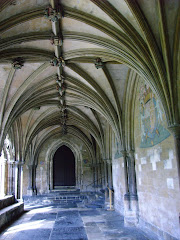We have been hearing about the freeing of the slaves of Israel from Egypt the past few weeks and the leadership of Moses—they were given direction by God through Moses, a reluctant leader, to hide their first born sons who were being killed by Pharaoh; plagues were sent to Egypt; then Pharaoh let them go, but he he reneged and chased them into the Red Sea where the waters parted for Israel but drowned the Egyptians and their chariots. This brings us to today’s story of the grumbling of the Israelites in the wildneness: “If only we had died by the hand of the Lord in Egypt, when we sat by the fleshpots and ate our fill of bread; for you have brought us into the wilderness to kill the whole assembly with hunger.”
I can relate to this feeling of wilderness. Often in times of being between one thing and not quite starting another—whether it is moving into a new job, a new relationship, or just being in limbo in myself—I get very scared like the Israelites today.
This place of no man’s land, the wilderness, can be a place of unsettledness, when a person knows where they came from but don’t know yet where they are going. In those limbo times, I remember that in the past I knew exactly what to expect, when to expect it, and felt more in control of my life, even though that life was not a full life, I was not my full self, was not using all the gifts God has given me. That time before looked so much better than the wandering and uncertainty of the wilderness that I forgot what it was really like, and how less a person I was in the enslavement of my self.
When the future is in a fog, it is easier for me to have selective memory about the past, to romanticize it, to forget about the hard things, the false things about myself or others, to think of only the things I have lost, not the things I needed to get rid of to live more honestly and faithfully.
But the wilderness is a time of liminality—that’s a fancy word for a threshold, a place where we have left something behind, but are not yet where we are going. It is a place of waiting, but also of learning. A fallow place, like a field that is lying dormant for a season. The purpose of that dormancy is the building up of the nutrients of the soil, of allowing the nitrogen and phosphorus and potassium to reconstitute, readying the soil for another season of planting.
For the Israelits, Moses brought God into their moment of liminality. Moses prayed on behalf of his grumbling community about the hunger they felt and God heard their grumbling and responded with what they needed—bread and meat. It seemed like a miracle. They were in a desert and suddenly quails were coming every morning and manna every evening. They began to see that there was nourishment in the middle of nothingness and began to eat. Their physical hunger began to be fed and in their spiritual hunger they saw that God was listening to them in their distress. They began to trust in God in the middle of waiting on this threshold of their lives.
The wilderness was a place of learning the faithfulness of God for the Israelites and it can be for us too. Because the wilderness is a place of difference, a new place, it takes me out of myself, my old habits and ways of being, my old ways of thinking and acting. This time of newness and uncertainty makes it easier to rely more on God’s grace, if I can only stay in the place of newness and let God take care of me.
Whenever the place we’re in challenges us, God is as near to us as our prayer. We may not see quails and manna come from heaven, but you can be sure that God’s abundant love for you surrounds you in your place of uncertainty. God sends us miracles of people and assistance in unlikely ways, so we need to be specially looking for God’s hand.
And more importantly, while we think we know what we want our future to be, God may be trying to give us something different and even more wonderful. It has happened in my life many times. I cannot know what wonderful things God has in store for me. Like the workers in the vineyard today, I may be coming to the grapes at the end of the day, expecting only a partial wage, but God is going to give me the whole day’s pay. Others may grumble with envy, but I can rejoice that God is in my future, keeping me safe in the present uncertainty.
The Israelites grumbled today in their time of limality, but they learned that God has ways we cannot always fathom, mercy greater than we know, and love for us in ways we do not expect. The lesson in the wilderness is always that God cares deeply and is close at hand listening for our cries of distress.
And even more, God led the Israelites to the wilderness to ready them for the land of promise. God had so much more in store for them than meat and bread, God had prepared a place where they would be free to worship and build their lives with God’s hand in their future.
What is the land of promise that God has in store for you? Are you willing to wait in the wilderness, to listen for the voice of God, to receive the abundance of God’s grace? Are you ready to grow with God in your wilderness, to prepare for the land of promise in your future?


No comments:
Post a Comment